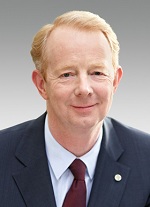 |
| Bayer CEO Marijn Dekkers |
Bayer is joining the growing number of drugmakers expanding production capacity in China but in Bayer's case, it is doing it with an acquisition. The German drugmaker is buying one of the top makers of over-the-counter drugs and herbal medicines in the country and getting a number of plants in the process.
Bayer said today that it would buy Dihon Pharmaceutical Group, a company it said has about 2,400 employees and sales last year of €123 million ($168 million). Started in 1993, its first product was the antibacterial cream Skineal. Bayer declined to say how much it paid, but according to Reuters, brokerage M.M. Warburg estimated the deal at about €500 million ($680 million). "This acquisition moves us into a leading position amongst multinationals in the OTC industry in China," Bayer CEO Marijn Dekkers said in a statement.
Bayer said Dihon has several manufacturing sites throughout China. According to Dihon's Website, its main facility is in Kunming National High-Tech Industrial Development Zone, with a two-story, 15,000-square-meter (161,000-square-foot) GMP preparation area.
A host of drugmakers, large and small, have been expanding production in China. Johnson & Johnson's ($JNJ) Janssen unit and Merck KGaA both announced plans in November to build facilities there. Janssen will start construction this year on a 267,000-square-meter plant in Xi'an to replace an existing plant built in 1985. It will spend between $200 million and $300 million. Merck will invest about €80 million ($107.67 million) to build a 40,000-square-meter plant in Shanghai that will focus on production of diabetes drugs.
But not everyone is enamored with the country's potential. Actavis ($ACT) recently bailed out on its China ventures. Last month, the Dublin-based drugmaker said it would sell its interest in Actavis (Foshan) Pharmaceuticals Co., to Zhejiang Chiral Medicine Chemicals for an undisclosed sum. That venture has a plant in Foshan, China, that produces antibiotic, digestive and cardiovascular drugs. Actavis CEO Paul Bisaro said he finds China too risky and that he wants to focus on markets with more growth potential.
- read the release
- here's the Reuters story